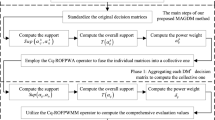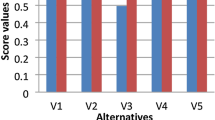Abstract
In this paper, the multiple attribute decision-making problems in which the attribute values take the form of q-rung orthopair cubic fuzzy sets (qRCOFSs) are investigated. Firstly, the definition of qROCFSs and some operational laws of qROCFSs are proposed. Then, a family of q-rung orthopair cubic fuzzy maclaurin symmetric mean aggregation operators are developed, such as the q-rung orthopair cubic fuzzy maclaurin symmetric mean (q-ROCFMSM) operator, the q-rung orthopair cubic fuzzy weighted maclaurin symmetric mean (q-ROCFWMSM) operator, the q-rung orthopair cubic fuzzy dual maclaurin symmetric mean (q-ROCFDMSM) operator, the q-rung orthopair cubic fuzzy weighted dual maclaurin symmetric mean (q-ROCFWDMSM) operator. And the properties and special cases of these proposed operators are studied. Furthermore, an approach based on the q-ROCFWMSM operator and the q-ROCFWDMSM operator is proposed for multiple attribute decision-making problems under q-rung orthopair cubic fuzzy environment. Finally, a numerical example and comparative analysis is given to illustrate the application of the proposed approach.
Similar content being viewed by others
Explore related subjects
Discover the latest articles, news and stories from top researchers in related subjects.Data Availability
Enquiries about data availability should be directed to the authors.
References
Aldo JVS, Luis P, Erwin MG, David LC, Delia VR (2021) Dimensional Analysis under Linguistic Pythagorean. Fuzzy Set Symmetry. 13(440):440
Aliya F, Saleem A, Fazli A (2021a) Aggregation operators on cubic linguistic hesitant fuzzy numbers and their application in group decision-making. Granular Comput 6(2):1–18
Aliya F, Naveed Y, Wathek C (2021) Maclaurin symmetric mean aggregation operators based on cubic Pythagorean linguistic fuzzy number. J Amb Intel Hum Comp 12(20):1925–1942
Atanassov KT (1986) Intuitionistic fuzzy sets. Fuzzy Sets Syst 20(1):87–96
Ayub S, Abdullah S, Ghani F, Qiyas M, Yaqub KM (2021) Cubic fuzzy heronian mean dombi aggregation operators and their application on multi attribute decision making problem soft computing a fusion of foundations. Methodol. Appl. 25(6):4175–4189
Azim AB, Ali A, Ali S, Fahmi A, Siddiqa A (2021) A new approach of cubic interval-valued intuitionistic fuzzy subsemigroup and ideals. Granular Comput 6(2):1–18
Detemple D, Robertson J (1979) On generalized symmetric means of two variables Univ. Beograd Publ Elektrotehn FakSer Mat Fiz. 236–238
Feng X, Shang XP, Xu Y, Wang J (2020) A method to multi-attribute decision-making based on interval-valued q-rung dual hesitant linguistic Maclaurin symmetric mean operators. Complex Intell Syst. 693:447–468
Garg H, Ali Z, Mahmood T (2021) Algorithms for complex interval-valued q-rung orthopair fuzzy sets in decision making based on aggregation operators. AHP, and TOPSIS Expert Syst 38(1):1–36
Gülçin B, Fethullah G, Deniz U (2021) A novel Pythagorean fuzzy set integrated Choquet integral approach for vertical farming technology assessment. Comput Ind Eng 158:107384
Harish G, Rishu A (2020) Maclaurin symmetric mean aggregation operators based on t-norm operations for the dual hesitant fuzzy soft set. J Amb Intel Hum Comp 11(1):375–410
Harish G, Zeeshan A, Mahmood T (2021) Generalized dice similarity measures for complex q-Rung Orthopair fuzzy sets and its application. Complex Intell Syst. 7(2):667–686
He X, Li Y, Qin K, Meng D (2019) Distance measures on intuitionistic fuzzy sets based on intuitionistic fuzzy dissimilarity functions. Soft Comput. 24(1):523–541
Jin CX, Ran Y, Zhang GB (2021) Interval-valued q-rung orthopair fuzzy FMEA application to improve risk evaluation process of tool changing manipulator Appl. Soft Comput 14:107192
Jun YB, Kim CS, Yang KO (2012) Cubic Set. Ann Fuzzy Math Inf 4(1):83–98
Lang GM, Miao DQ, Fujita H (2020) Three-way group conflict analysis based on pythagorean fuzzy set theory. IEEE Trans Fuzzy Syst 28(3):447–461
Liu PD, Yang HY (2020) Three-way decisions with intuitionistic uncertain linguistic decision-theoretic rough sets based on generalized maclaurin symmetric mean operators. Int Fuzzy Syst 22(2):653–667
Liu PD, Chen SYM, Wang P (2020a) Multiple-attribute group decision-making based on q-rung orthopair fuzzy power maclaurin symmetric mean operators. IEEE T Syst Man CY-S 50(10):3741–3756
Liu PD, Chen SYM, Wang YM (2020b) Multiattribute group decision making based on intuitionistic fuzzy partitioned Maclaurin symmetric mean operators. Inf Sci 512:830–854
Liu Y, Wei GW, Abdullah S, Liu J, Xu L, Liu HB (2021) Banzhaf–Choquet-copula-based aggregation operators for managing q-rung orthopair fuzzy information. Soft Comput. 25(10):6891–6914
Liu PD, Pan Q, Xu HX (2021) Multi-attributive border approximation area comparison (MABAC) method based on normal q-rung orthopair fuzzy environment. J Intell Fuzzy Syst. 40(5):1–27
Liu HB, Liu Y, Xu L, Abdullah S (2021c) Multi-attribute group decision-making for online education live platform selection based on linguistic intuitionistic cubic fuzzy aggregation operators. Comput Appl Math 40(1):16
Maclaurin C (1729) A second letter to Martin Folkes, Esq concerning the roots of equations, with demonstration of other rules of algebra Philos Trans Roy Soc London Ser A. 36:59–96
Mahboob A, Rashid T (2020) Multistage Decision Approach for Short Life Cycle Products Using Pythagorean. Fuzzy Set J Intell Fuzzy Syst 40(1):1343–1356
Mohagheghi V, Mousavi SM, Mojtahedi M, Newton S (2020) Evaluating large, high-technology project portfolios using a novel interval-valued Pythagorean fuzzy set framework: an automated crane project case study. Expert Syst Appl. 162:113007
Mu ZM, Zeng SZ, Wang PY (2021) Novel approach to multi-attribute group decision-making based on interval-valued Pythagorean fuzzy power Maclaurin symmetric mean operator. Comput Ind Eng 155:107049
Muhammad A, Sumera N, Edalatpanah SA, Rida M (2021a) Group decision-making framework under linguistic q-rung orthopair fuzzy Einstein models. Soft Comput 25(15):10309–10334
Muhammad Q, Saleem A, Liu Y, Muhammad N (2021) Multi-criteria decision support systems based on linguistic intuitionistic cubic fuzzy aggregation operators. J Amb Intel Hum Comp 12(8):8285–8303
Muhammad R, Anam H, Muhammad J K, Poom K (2021) Correlation coefficients for cubic bipolar fuzzy sets with applications to pattern recognition and clustering analysis IEEE Access 1
Pranjal T, Palash D (2021) Distance measures for cubic pythagorean fuzzy sets and its applications to multicriteria decision making. Granular Comput 6(2):1–18
Qi M, Yang Z, Ren W, Wang H (2019) Lorentzian knowledge measures for atanassov’s intuitionistic fuzzy sets. J Intell Fuzzy Syst 36(1):473–486
Qin JD, Liu XW (2015) approaches to uncertain linguistic multiple attribute decision making based on dual maclaurin symmetric mean. J Intell Fuzzy Syst 29(1):171–186
Qin YC, Cui XL, Huang MF, Zhong YR, Tang ZM, Shi PZ (2021) Multiple-attribute decision-making based on picture fuzzy archimedean power maclaurin symmetric mean operators. Granular Comput 6(3):737–761
Rong Y, Liu Y, Pei Z (2020) Complex q-rung orthopair fuzzy 2-tuple linguistic Maclaurin symmetric mean operators and its application to emergency program selection. Int J Intell Syst 35(11):1749–1790
Sanum A, Saleem A, Fazal G, Muhammad Q, Muhammad YK (2021) Cubic fuzzy Heronian mean Dombi aggregation operators and their application on multi-attribute decision-making problem. Soft Comput Fusion Found Methodol Appl 25(6):4175–4189
Talukdar P, Dutta P(2021) Distance measures for cubic Pythagorean fuzzy sets and its applications to multicriteria decision making. Granular Comput 6(2)
Xu WH, Shang XP, Wang J (2021) Multiple attribute group decision-making based on cubic linguistic pythagorean fuzzy sets and power Hamy mean. Complex Intell Syst 7(3):1673–1693
Yager RR (2017) Generalized orthopair fuzzy sets. IEEE Trans Fuzzy Syst 25(5):1222–1230
Yager R R (2013) Pythagorean fuzzy subsets. In: Proc. Joint IFSA World Congress and NAFIPS Annual Meeting 57–61
Zadeh LA (1965) Fuzzy sets. Inf. Control 8(3):338–353
Zhang ZM, Chen SYM (2021) Group decision making with incomplete q-rung orthopair fuzzy preference relations. Inf Sci 553:376–396
Zhang Q, Hu JH, Feng JF, Liu A (2020a) Multiple criteria decision making method based on the new similarity measures of Pythagorean fuzzy set. J Intell Fuzzy Syst 39(1):809–820
Zhang MY, Zheng TT, Zheng WR, Zhou LG (2020) Interval-valued pythagorean hesitant fuzzy set and its application to multiattribute group decision-making. Complexity 2020:1–26
Zhong YR, Cao LB, Zhang HN, Qin YC, Huang MF, Luo XN (2021) Hesitant fuzzy power Maclaurin symmetric mean operators in the framework of Dempster–Shafer theory for multiple criteria decision making J Amb Intel Hum Comp
Acknowledgements
This article was supported by the Science and Technology Research Program of Chongqing Municipal Education Commission (Grant No.KJQN201901505).
Funding
This article was supported by the Science and Technology Research Program of Chongqing Municipal Education Commission (Grant No. KJQN201901505), Key Project of humanities and social sciences research of Chongqing Municipal Education Commission in 2022(Grant No:22SKGH432), Key Project of humanities and social sciences research of Chongqing Municipal Education Commission in 2022(Grant No:22SKGH428).
Author information
Authors and Affiliations
Corresponding author
Ethics declarations
Conflict of interest
The authors declare that they have no conflict of interest.
Ethical approval
This article does not contain any studies with human participants or animals performed by any of the authors.
Additional information
Publisher's Note
Springer Nature remains neutral with regard to jurisdictional claims in published maps and institutional affiliations.
Rights and permissions
About this article
Cite this article
Yu, Q., Cao, J., Tan, L. et al. Multiple attribute decision-making based on maclaurin symmetric mean operators on q-rung orthopair cubic fuzzy sets. Soft Comput 26, 9953–9977 (2022). https://doi.org/10.1007/s00500-022-07363-7
Accepted:
Published:
Issue Date:
DOI: https://doi.org/10.1007/s00500-022-07363-7




